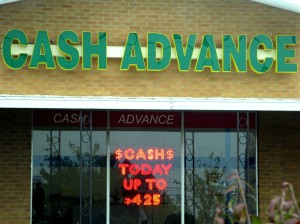Merchant Cash Advance – A lump-sum payment to a business in exchange for an agreed-upon percentage of future credit card and/or debit card sales. The term is now commonly used to describe a variety of small business financing options characterized by short payment terms (generally under 24 months) and small regular payments (typically paid each business day) as opposed to the larger monthly payments and longer payment terms associated with traditional bank loans. The term Merchant Cash Advance may be used to describe purchases of future credit card sales receivables, revenue and receivables factoring or short-term business loans.
Merchant Cash Advance companies, provide funds to businesses in exchange for a percentage of the businesses daily credit card income, directly from the processor that clears and settles the credit card payment. A company’s remittances are drawn from customers’ debit-and credit-card purchases on a daily basis until the obligation has been met. Most providers form partnerships with payment processors and then take a fixed variable percentage of a merchant’s future credit card sales.
These Merchant Cash Advances are not loans – rather, they are a sale of a portion of future credit and/or debit card sales.
This structure has some advantage over the structure of a conventional loan. Most importantly, payments to the merchant cash advance company fluctuate directly with the merchant’s sales volumes, giving the merchant greater flexibility with which to manage their cash flow, particularly during a slow season. Advances are processed quicker than a typical type loan, giving borrowers quicker access to capital. Also, because MCA providers like typically give more weight to the underlying performance of a business who may not qualify for a conventional loan.
Merchant Cash Advances are often used by businesses that do not qualify for regular bank loans, and are generally more expensive than bank loans. Competition and innovation led to downward pressure on rates and terms are now more closely correlated with an applicant’s FICO score.
There are generally three different repayment methods:
Split withholding – when the credit card processing company automatically splits the credit card sales between the business and the finance company per the agreed portion. The most common preferred method of collecting funds for both the clients and finance companies since it is seamless.
Lock box or trust bank account withholding – all of the business’s credit card sales are deposited into bank account controlled by the finance company and then the agreed upon portion is forwarded onto the business via ACH, EFT or wire. The least preferred method since it results in a one-day delay in the business receiving the proceeds of their credit card sales.
ACH withholding – when structured as a sale, the finance company receives the credit card processing information and deducts its portion directly from the business’s checking account via ACH. When structured as a loan, the finance company debits a fixed amount daily regardless of business sales.
